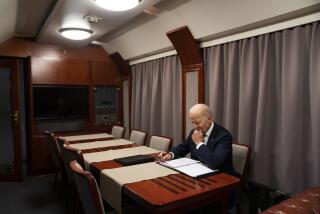Iraq War Eclipses Domestic Agenda
WASHINGTON — Pity the advocates of overhauling Social Security. They have been told for months that President Bush would give a major speech pushing their cause as the cornerstone of his new domestic agenda.
But so far it has remained just another laundry-list item in Bush’s campaign speech, overshadowed by the president’s response to the avalanche of trouble in Iraq.
“There’s some frustration for people who thought this would happen in January,” said Grover Norquist, a conservative activist pushing the idea. “But stuff keeps happening.”
That is just one symptom of the toll being taken by the war in Iraq, a festering crisis that has become the political equivalent of a black hole, absorbing White House energy, public attention and the media spotlight.
Forced to pour its political capital into maintaining support for U.S. policy in Iraq, the White House has had less time, energy and money to spend on other controversial issues. That has contributed to the fact that Bush’s plans to expand free trade with Australia and Central America have stalled, and his proposal to liberalize immigration rules has gone nowhere. His program to promote economic and political reform in the Third World is expected to be under-funded because of soaring Iraq war costs.
And on the campaign trail, the intense glare of the prisoner abuse scandal is making it harder for Bush to highlight positive news -- such as the latest report on job creation.
“Iraq is displacing all other issues, coloring all other issues,” said a Republican lobbyist who is working with the Bush campaign. “They would prefer to run a more balanced campaign. I’m not sure they can do it, because the battlefield smoke will never clear long enough to sustain other issues.”
The long shadow of Iraq has gotten even longer with the controversy over the abuse of Iraqis at Abu Ghraib prison by U.S. personnel.
“The abuses are all so serious, so troubling, that they distract from the administration’s ability to pursue other issues,” said Sen. Susan Collins (R-Maine). “They suck all the energy out of Washington.”
Not only is the war dominating attention, it is diminishing the political luster of the president’s national security team, including Defense Secretary Donald H. Rumsfeld and national security advisor Condoleezza Rice, who were once considered by many to be the strongest members of Bush’s inner circle.
An extended immersion in this nettlesome issue, some analysts say, could have a longer-term effect on Bush’s legacy: It could hurt his ability to launch a strong second term, if he were to win one.
“This whole controversy is swallowing up the administration, driving it back in terms of what it needs to do in building a Cabinet and an agenda for a second term,” said Paul Light, a New York University public service professor.
“It’s a black hole.”
The focus on the prisoner abuse scandal has also made it harder for the presumptive Democratic presidential nominee, Sen. John F. Kerry, to get his message out. But the good news for the Massachusetts senator is that the controversy seems to be taking a toll on public approval of the president, making Bush more vulnerable to Kerry’s challenge. Polls still show a close race, but the newest surveys have given Kerry a slight lead.
Bush advisors say that the president’s focus is appropriately trained on Iraq and national security because Americans are worried about the same things.
“Those issues are on the minds of almost every American every day,” said Terry Holt, spokesman for Bush’s reelection campaign. “The president’s broad message day in and day out is safety, security, prosperity.”
Bush is still putting considerable public effort into highlighting other issues and his domestic policy accomplishments. He took three days in early May to tour the Midwest and talk about the economy. Last week he held three events to discuss education. “The American people obviously are focused on Iraq, the fight on terror, but that doesn’t mean they have lost their focus on public education and other things,” said Trent Duffy, a White House spokesman. “The bottom line is the president continues to have a very vibrant and progressive vision for the country.”
But even some Republicans say that Iraq, at the least, has made it harder for Bush to convey that vision.
“I don’t think Iraq gets in the way of developing a domestic agenda,” said former House Speaker Newt Gingrich. “It’s gotten in the way of communicating it.”
Recent news briefings at the White House have been given over largely to questions about Iraq. Many Republicans have found the public. At an education event last week in Arkansas, Bush drew the biggest round of applause when he praised the military in Iraq.
“The war in Iraq has probably made it a lot more difficult to get resonance with other issues,” said Sen. Jon Kyl (R-Ariz.), who recently held a town hall meeting on Medicare that was dominated by questions and comments on Iraq.
What is most frustrating for Bush allies, and potentially the most consequential politically, is how a recent spate of good economic news has been eclipsed by the prisoner abuse scandal in Iraq.
For example, the Labor Department recently reported strong job gains in April. But the report made less of an impression than it might have, because it came out the same day Rumsfeld dominated the headlines with his first congressional testimony on the Abu Ghraib scandal.
“The fact the economy has come back so strongly has been totally lost because it’s been swamped by the bad news from Iraq,” Collins said.
The latest Gallup poll found that, despite improvements in the economy of late, 51% of those surveyed believed the economic condition of the country was getting bleaker.
To make matters worse, some Republicans fear, the prison scandal could undermine economic growth. “One thing markets hate more than anything else is uncertainty,” said Sen. Robert F. Bennett (R-Utah.). The turmoil over the prison scandal, he said, “raises questions about whether we will prevail [in Iraq], and we’ve already seen the markets react to that uncertainty.”
The focus on Iraq has not prevented Bush from introducing domestic initiatives, but most of them have stalled. Congressional aides say that Bush’s proposals to overhaul immigration, to start a new round of space exploration, to amend the Constitution to ban gay marriage and to open new free-trade agreements are going nowhere in Congress.
That is in part because Congress is mired in election-year gridlock. But it is also because Bush has not exerted the kind of concerted presidential push that those initiatives would need under any circumstance.
“I think Iraq is sucking the oxygen out of virtually all other initiatives” in trade policy, said Gary Hufbauer, a trade analyst at the Institute for International Economics. “All of them require some political capital, and [administration officials] don’t want to do it when you need all your political capital to keep support for the Iraq endeavor.”
Many advocates of changing Social Security are disappointed that Bush has not yet spoken out more forcefully for establishing personal accounts so people could decide how to invest some of their retirement taxes. They think the idea is controversial enough that it needs to be pushed hard during the 2004 campaign, to educate people and to give Bush a mandate to make changes in a second term.
“We are looking forward to a major speech on it, but it has been continually pushed back,” said Michael Tanner, a policy analyst at the Cato Institute, a libertarian think tank in Washington. “There’s a feeling among some of his advisors that Bush needs to be focusing on [Iraq] and not having other controversial things coming up.”
Duffy denied that discussion of such issues had been postponed simply because of Iraq, and said Bush would discuss them in time.
Some foreign policy experts worry that all the resources showered on Iraq have distracted attention from other international hotspots.
Senate Foreign Relations Chairman Richard G. Lugar (R-Ind.) expressed such worries in meetings last week with Bush and senior administration officials. Lugar voiced particular concern that the United States was giving short shrift to its ties with Russia, rebuilding Afghanistan, and nuclear nonproliferation, said the senator’s spokesman, Andy Fisher.
Although the Bush administration had argued that a successful military operation in Iraq would help advance the Mideast peace process, negotiations between Israel and the Palestinians have stalled. Secretary of State Colin L. Powell has acknowledged that the prisoner abuse scandal has set back efforts to restart the peace talks.
The spiraling cost of the Iraq war is also taking a toll on one of Bush’s signature initiatives in foreign policy: his effort to spur political and economic reforms in Third World countries in exchange for foreign aid. That Millennium Challenge Account program is sure to be shortchanged in Congress this year, Republicans say, as lawmakers struggle to come up with the additional $25 billion Bush recently requested for Iraq.
Iraq is also draining human resources from the foreign policy establishment. Several senior ambassadors, including U.S. envoys to Bahrain and Kuwait, have been pulled from their posts and deployed to Iraq.
“What is the signal that sends to the world?” asked a senior State Department official. “America’s got one focus, and we can’t chew gum and walk at the same time.”
Times staff writer Mary Curtius contributed to this report.
More to Read
Sign up for Essential California
The most important California stories and recommendations in your inbox every morning.
You may occasionally receive promotional content from the Los Angeles Times.











